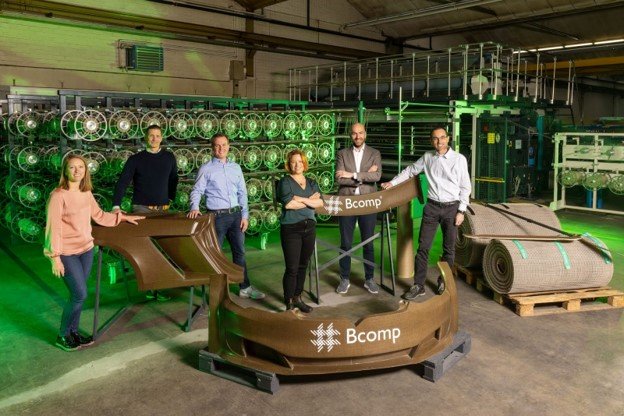Natural Fibers for Sustainable Lightweighting: Our Investment in Bcomp
Image: Bcomp material on a BMW vehicle
We are thrilled to announce our lead investment in the Series B financing round of Bcomp. Bcomp has developed several materials from flax fibers that provide sustainable and lightweight automotive interiors and exteriors including reinforcement grids and coverings. Bcomp’s set of novel material alternatives outperforms conventional natural fiber polypropylene (NFPP) or composite materials across the requirements needed for automotive applications with conventional equipment, reduces use of virgin plastic and offers end-of-life recycling and thermal recovery options. Their flax-based composite fabric can substitute carbon fiber, glass fiber and polymers for non-structural and semi-structural car parts.
In order to reduce the average carbon footprint of fleets, automotive players will have to find new levers to reduce carbon emissions. One avenue for auto OEMs to reduce their impact is to mitigate the impact from production by replacing energy-intensive thermoplastic composites with sustainable natural composites. Conventional internal car components are made of materials that are high in cost and weight relative to those made from natural fiber composites.
As such, automotive manufacturers would need to undergo a sustainable material revolution to achieve further reduction in their impact on the environment. The manufacturing of cars with circularity and sustainable materials in their design will make strides toward reducing the carbon footprint by minimizing the use of non-renewable, energy intensive materials such as plastic, and incorporating sustainable materials. Sustainable material choices, however, are constrained by scale and performance:
Scale: Plant fibers possess high oscillations in quality, which depends on growth rate and the absorption of moisture. Consistent material properties are strongly dependent on the context, specifically where the crop is cultivated, how the treatment is made, how it is processed and applied.
Performance: Natural fiber composites are poorer in certain mechanical properties compared to synthetic fiber composites, such as stiffness. In addition, their bonding with polymer matrices is weak.
Bcomp addresses the limitations of incorporating natural fiber composites into vehicles by developing a flax-based composite fabric that can substitute carbon fiber, glass fiber and polymers for non-structural and semi-structural car parts. Bcomp has several main products, including ampliTex, a high performance technical reinforcement fabric made completely out of flax strings that are weaved together and is being used to replace covering materials as a visual layer, and powerRibs, a highly engineered, extremely lightweight natural fiber reinforcement grid that adds maximal stiffness at minimal weight on one side of a thin walled shell element. Bcomp addresses the issues of scalability and performance as follows:
Bcomp’s products outperform existing solutions in terms of performance qualities: The material made from regenerative inputs can achieve a weight reduction of up to 50%, reduce plastic by up to 70% and dramatically reduce greenhouse gasses from both the material and consumption impact. Additionally, Bcomp’s solutions show higher safety properties as the material does not shatter into debris.
Bcomp uses existing partners and equipment to produce their composites: External ampliTex and bCores are manufactured by external partners as a plug and play solution for parts manufacturers. In addition, Bcomp has already transitioned to in-house production of powerRibs.
Bcomp has established relationships with competent suppliers of natural fibers: Bcomp directly buys the flax fiber from spinners based in France and Eastern EU and it has close ties with scutchers to ensure the stability of its supply chain.
We believe that Bcomp is well-positioned to catalyze sustainable material innovation within the industry. Our investment will support Bcomp as they expand their product offerings and entry into various new verticals.
Image: From left to right, Marion Jégo (COO), Per Martensson (CSO), Tobias Laederach (CFO), Ebba Carlson (CMO), Christian Fischer (CEO), Julien Rion (CTO)
Bcomp is led by an extremely seasoned team with profound experience in both material science and the automotive industry. The complementary mixture of their experiences emphasizes our team’s high conviction that Bcomp will lead the way for developing sustainable, lightweight materials in vehicles and beyond.


